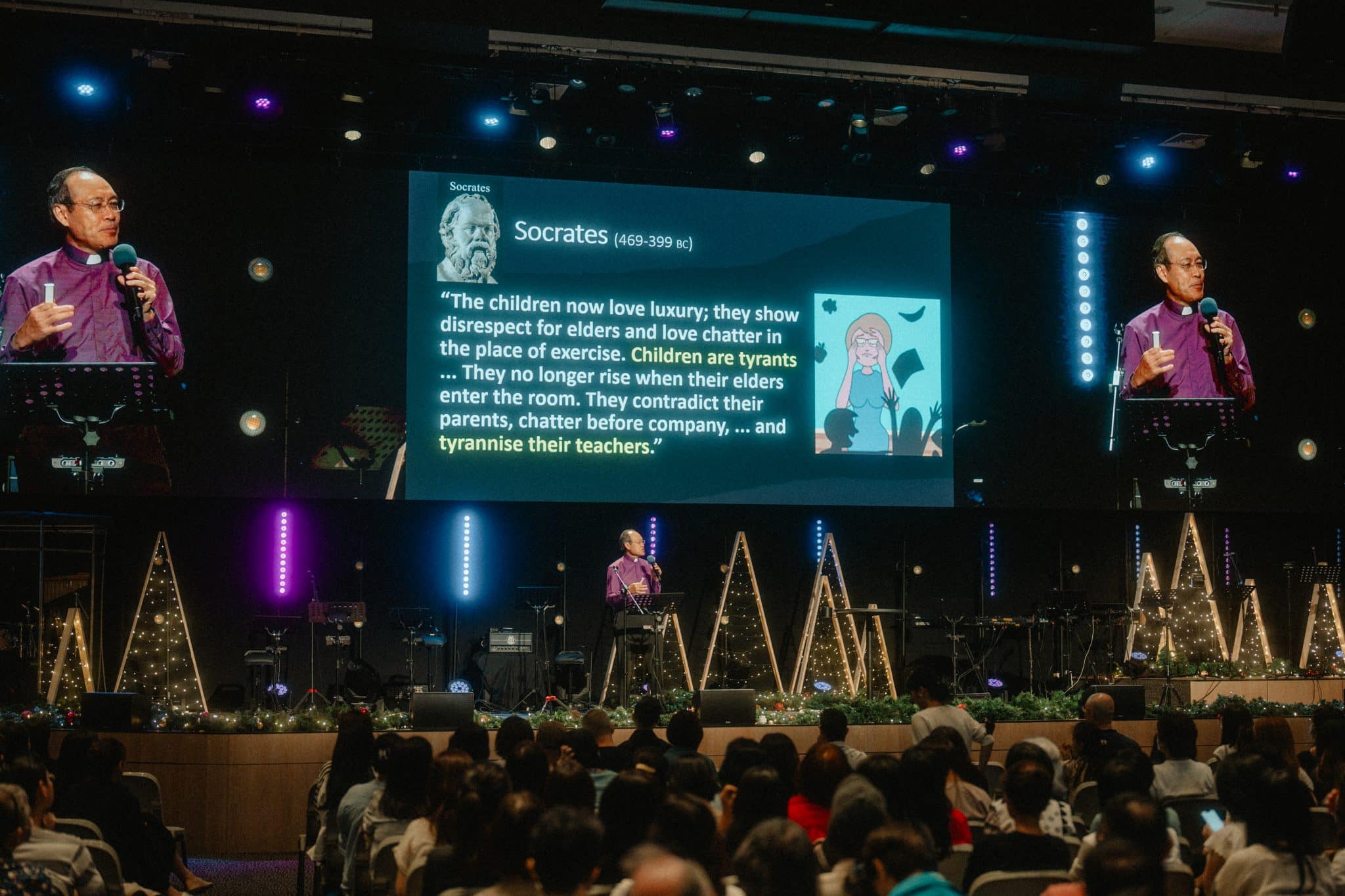“You help us see beyond the present to a divine future”: Bishop Dr Gordon Wong to teachers
Bishop Dr Gordon Wong, The Methodist Church in Singapore // January 30, 2024, 10:15 pm

"Educators provide an absolutely essential service for the running and the continuing survival of our modern world," notes Bishop Dr Gordon Wong at the inaugural Salt&Light National Christian Educators Conference. Photo by Yan Krukau on Pexels.
Someone has said that teaching is the one profession that creates all other professions.
Someone else has said: “Without teachers, life has no class.”
So thank you, teachers, for giving class to our lives!

Bishop Dr Gordon Wong giving the keynote address on “Teaching: The Noble Profession” at the inaugural 2023 National Christian Educators Conference organised by Salt&Light. Photo by Thirst Collective.
But as much as we praise God for the wonderful vocation and gift of education, we know that the work of education is not romantic work. It is robust work.
Someone else has said: “Without teachers, life has no class.” Thank you, teachers, for giving class to our lives!
Here’s how an educator described schoolchildren in his day: “The children now love luxury; they show disrespect for elders and love chatter in the place of exercise. Children are tyrants. They no longer rise when their elders enter the room. They contradict their parents, chatter before company and tyrannise their teachers.”
Do teachers feel the same today?
This lament comes from a famous educator who lived, not in our modern era, but over 2,500 years ago. He was Socrates, the wise Greek philosopher who lamented how difficult it was in his day to educate children.
We all know teaching is tough. Work is tough. Life is tough. It was tough in the days of Socrates. It was tough in the days when the apostle Paul wrote a letter to the Colossians.
The profession that creates all others
I was once asked by a group of Methodist teachers to speak from Colossians 3:23: “Whatever you do, work heartily as for the Lord and not for men.” (Colossians 3:23)
Who was Paul addressing these words to? The verse before, verse 22, makes it clear. The apostle Paul was writing to slaves.
I wonder if teachers sometimes feel treated as slaves in the machinery of modern education.

Almost 450 educators turned up at the inaugural Salt&Light National Christian Educators Conference in December 2023 to be refreshed in spirit before beginning a new year of teaching. Photo by Thirst Collective.
A slave, by definition, was someone who had no freedom to choose what work he or she could or could not do. Slaves did anything and everything that the master told them to do. They had to get up very early every morning and they could not rest till their masters had retired. Life was tough.
Educators provide an absolutely essential service for the running and the continuing survival of our modern world.
But the work which the slaves did was absolutely essential to the way life functioned in Graeco-Roman society.
As a scholar of that time, a historian, has said: “Slaves were the gas, electricity and internal combustion engines of the Graeco- Roman world.” (NT Wright)
So, if teaching is, in fact, the profession that makes possible all other professions, then educators provide an absolutely essential service for the running and the continuing survival of our modern world.
Some people today criticise Paul for asking the slaves to work heartily. They say that Paul should have encouraged slaves to rise up in protest at the unfair working conditions.
There certainly were such slave revolts fighting for their freedom in that era. But my guess is that Paul had decided that such rebellion then would have led to terrible loss of many lives and great harm for everyone including the slaves themselves.
3 reminders when the going gets tough
What did Paul do to encourage slaves in his day? He reminded them of three things:
1. Masters are accountable to God
Paul lets the slaves know that God will hold their masters accountable for the way they were treated. (Colossians 3:25-4:1)
God requires human masters to treat their slaves rightly and fairly because, whether they believe in God or not, God is indeed their Master who will one day call all human masters to account.
This biblical truth is a great encouragement to those of us who feel terribly mistreated by our “masters”.
God promises that He will give masters what their actions deserve. Trust God to judge them in His time.
2. We slave for Christ as our true Master
Paul tells slaves to think of the Lord Jesus Christ as being their good and true Master (Colossians 3:23-24)
Work as for the Lord. You are serving the Lord Christ.
In Paul’s day there was no requirement for human masters to give any reward to their slaves. The law did not even allow slaves to receive any inheritance. Any assets or money that might come to a slave would automatically go to the master’s family.
But Paul promises the slaves that, even though on earth they do not receive any reward or inheritance, their real Master, God, will give them a great inheritance.
So for times when we feel angry or frustrated that the rewards we receive for our long and hard years of service seem so unfair, or even insulting, Paul tells us to believe that the God of the Bible, who is our true and generous Master, will give a more than fair reward and inheritance to all who work and slave faithfully on earth.
3. We work heartily for Christ
Literally this means to put our soul into our work. When someone works heartily or enthusiastically at something, it is such a blessing to others.
Even when you go and eat at a restaurant, if the server is grouchy, it can make the whole dinner experience unpleasant. On the other hand, when the server is friendly and cheerful, it is so much more pleasant and it is a blessing for us.
Maybe the Bible is also saying that serving heartily can make the work more pleasant for the server.
If the slave imagines that in serving human masters he is really serving the gracious, wonderful Lord God himself, then the slave puts his soul and his heart into his service. And in so doing the work becomes less of a boring burden and much more of an honour and privilege serving God.
Working for the Lord and not for men
I remember listening to the testimony of someone who works as a garbage collector.
He said he finds his work to be very fulfilling.
“Knowing that I am serving God and my neighbours gives me joy and fulfilment in my work.”
“After a while you get used to the smell and God has helped me see that garbage removal is an essential service in our world. What would happen to us if nobody was prepared to remove the garbage?
“And knowing that I am serving God and my neighbours gives me joy and fulfilment in my work.
“Yes, I wish society would reward my work with a bit more money. But I remind myself that I am removing garbage for my Lord and Master Jesus Christ, who has assured me that my reward and inheritance will be great in heaven.
“And if there is any garbage that will need removal in heaven, I will mostly gladly take on that same role where, in heaven, I am certain my Master will more than adequately reward and commend my service!”
The Bible says whatever you do, work heartily, as for the Lord and not for men.
What are we turning towards today?
There was once a teacher of Modern Languages and Literature. He lived during the very dark and terrible days of the American Civil War in the 1860s.
Seeing the violent deaths of hundreds of young men fighting between north and south, killing each other, made him lose heart. What was happening in the world?
“There is a tendency for some in suffering to turn away from God. But in heaven’s name, turn away to what?”
Professor Henry Longfellow’s heart was turning cold and cynical towards the promises of joy and the peace of Christmas. And during those dark times, he wrote these words:
I heard the bells on Christmas Day
Their old familiar carols play
And wild and sweet their songs repeat
Of peace on earth, goodwill to men
But the war and the killing and the dying made all these familiar Christmas promises sound so naïve, so useless. And Longfellow’s second verse read:
But in despair I bowed my head
There is no peace on earth, I said
For hate is strong and mocks the song
Of peace on earth, goodwill to men
Today, we also live in a dark period of human history.
COVID-19 still darkens our lives, and now many more lives are being lost in bombs, battles between Hamas and Israel, Russia and Ukraine. There are floods and fires that take so many lives. There is exclusion and exploitation, neglect and abuse. Tragedy darkens our world still and mocks the song of “peace on earth, goodwill to men”.

“Teaching is often described as nurturing or planting seeds which will grow and blossom and transform into something beautiful,” said Rev Dr Wong in appreciation of the educators at the Conference. Photo by Thirst Collective.
In the midst of such tragic darkness, it is hard not to shake our heads in despair and discouragement. Hard not to become cynical; hard not to mock the promise of peace, goodwill amongst human beings. There is so little goodwill.
But friends, giving up does not help us or our world.
As GK Chesterton, another famous educator, said: “When belief in God becomes difficult because of suffering, there is a tendency for some to turn away from God. But in heaven’s name, turn away to what?”
Turning away from God does not make the suffering and darkness and tragedies disappear. So why turn away? Turn away to what?
The horror of war almost pushed Henry Longfellow to turn away from God and turn to despair and cynicism. Thank God he did not and in the final verse, Longfellow reaffirmed his hope and his faith with the Good News:
Then rang the bells more loud and deep
God is not dead, nor does He sleep
The wrong shall fail, the right prevail
With peace on earth, goodwill to men
Rumour of a beautiful seed
Thank God for educators who inspire us to look beyond the present pain and tragedy toward a glorious future.
A music professor was once asked: “Professor, what is the true vocation of the musician or artist?”
That seems to be a good question to ask educators as well.
May your teaching be like rain and dew that inspire little seeds, at present so small and insignificant, buried underground.
The professor’s answer was: “Artists help people see or hear beyond the immediate to the eternal.”
That is not a bad answer for educators as well.
The true vocation of an educator is to help people see beyond the immediate distress and darkness to the eternal promise of a divine future.
That is why teaching is often described as nurturing or planting seeds which will grow and blossom and transform into something beautiful.
I love Moses’ prayer in Deuteronomy 32:2 (ESV) where he prays:
“May my teaching drop as the rain,
My speech distill as the dew,
Like gentle rain upon the tender grass,
And like showers upon the herb.”
Thank you, teachers, for your robust, tough work.
May your teaching be like rain and dew that inspire little seeds, at present so small and insignificant, buried underground. But seeds which will grow and be transformed into beautiful plants and trees of as yet to be seen rumour.
Please keep inspiring us to move beyond the present darkness and discouragement towards the delightful, divine future which God has promised.
Yours is a divine and glorious vocation.
May 2024 find all of us, with God’s help, working heartily as for the Lord and not for men, knowing that from the Lord we will receive His inheritance as our reward.
To Him be all the glory forever and ever.
This is an extract of Bishop Dr Gordon Wong’s message at the inaugural Salt&Light National Christian Educators Conference on December 22, 2023.
RELATED STORIES:
When an “Ah Beng” ex-drug addict and school teacher fell in love
We are an independent, non-profit organisation that relies on the generosity of our readers, such as yourself, to continue serving the kingdom. Every dollar donated goes directly back into our editorial coverage.
Would you consider partnering with us in our kingdom work by supporting us financially, either as a one-off donation, or a recurring pledge?
Support Salt&Light




